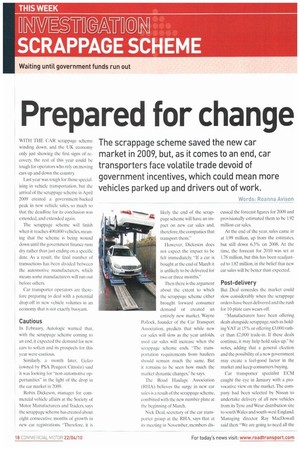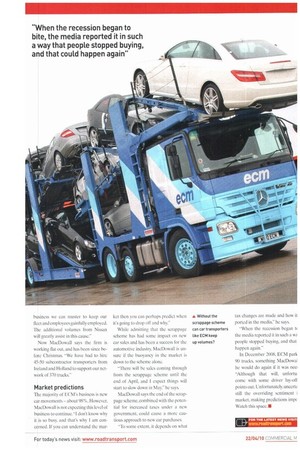Prepared for change
Page 18

Page 19

If you've noticed an error in this article please click here to report it so we can fix it.
The scrappage scheme saved the new car market in 2009, but, as it comes to an end, car transporters face volatile trade devoid of government incentives, which could mean more vehicles parked up and drivers out of work.
Words: Roanna Avison
WITH THE CAR scrappage scheinc winding down, and the UK economN only just showing the first signs of recovery, the rest of this year could be tough for operators who rely on moving cars up and down the country.
Last year was tough for those specialising in vehicle transportation, but the arrival of the scrappage scheme in April 2009 created a government-backed peak in new vehicle sales, so much so that the deadline for its conclusion was extended, and extended again.
The scrappage scheme will finish when it reaches 400,000 vehicles, meaning that the scheme is being wound down until the government finance runs dry rather than just ending on a specific date. As a result, the final number of transactions has been divided between the automotive manufacturers, which means some manufacturers will run out before others.
Car transporter operators are therefore preparing to deal with a potential drop-off in new vehicle volumes in an economy that is not exactly buoyant.
Cautious
In Fehruar Autologic warned that. with the scrappage scheme coming to an end, it expected the demand for new cars to soften and its prospects for this year were cautious.
Similarly, a month later. Gefco (owned by PSA Peugeot Citroen.) said it was looking for "non-automotive opportunities" in the light of the drop in the car market in 2009.
Robin Dickeson, manager for commercial vehicle affairs at the Society of Motor Manufacturers and -traders. says the scrappage scheme has created about eight consecutive months of growth in new car registrations. "Therefore, it is
likely the end of the scrappage scheme will have an impact on new car sales and, therefore, the companies that transport them."
However, Dickeson does not expect the impact to be felt immediately. "If a car is bought at the end of March it is unlikely lobe delivered for two or three months."
Then there is the argument about the extent to which the scrappage scheme either brought forward consumer demand or created an entirely new market. Wayne Pollock, founder of the Car Transport Association, predicts that while new car sales will slow as the year unfolds, used car sales will increase when the scrappage scheme ends. The transportation requirements from hauliers should remain much the same. But it remains to be seen how much the market dynamic changes," he says.
The Road Haulage Association ( RI IA) believes the surge in new car sales is a result of the scrappage scheme, combined with the new number plate at the beginning of March.
Nick Deal, secretary of the car transporter group at the RHA, says that at its meeting in November, members dis
cussed the forecast figures for 2009 and provisionally estimated them to be 4.92 million car sales.
At the end of the year, sales came in at 1.99 million, up from the estimates, but still down 6.3% on 2008. At the time, the forecast for 2010 was set at 1,78 million, but this has been readjusted to 1.82 million, in the belief that new car sales will be better than expected.
Post-delivery
But Dual concedes the market could slow considerably when the scrappage orders have been delivered and the rush for 10-plate cars wears off,
"Manufacturers have been offering deals alongside scrappage, such as holding VAT at 15% or offering £3,000 rather than .£2,000 trade-in, if these deals continue, it may help hold sales up," he notes, adding that a general election and the possibility of a new government may create a feel-good factor in the market and keep consumers buying.
Car transporter specialist ECM caught the eye in January with a provocative view on the market. The company had been selected by Nissan to undertake delivery of all new vehicles from its Tyne and Wear distribution site to south Wales and south-west England. Managing director Ray MacDowail said then: "We are going to need all the
business we can muster to keep our fleet and employees gainfully employed. The additional volumes from Nissan will greatly assist in this cause."
Now MacDowall says the firm is working flat out, and has been since before Christmas. We have had to hire 45-50 subcontractor transporters from Ireland and Holland to support our network of 370 trucks."
Market predictions
The majority. of Et.'M's business is new car movements— about 98%. However, MacDowall is not expecting this level of business to continue. "I don't know why it is so busy, and that's why I am concerned. If you can understand the mar
ket then you can perhaps predict when it's going to drop off and why."
While admitting that the scrappage scheme has had some impact on new car sales and has been a success for the automotive industry. MacDowall is unsure if the buoyancy in the market is down to the scheme alone.
'There will be sales coming through from the scrappage scheme until the end of April, and I expect things will start to slow down in May," he says.
MacDowall says the end of the scrappage scheme, combined with the potential for increased taxes under a new government, could cause a more cautious approach to new car purchases.
-To some extent. it depends on what tax changes are made and how it ported in the media," he says.
"When the recession began I( the media reported it in such a wa people stopped buying, and that happen again."
In December 2008, ECM park 90 trucks, something MacDowal he would do again if it was neo "Although that will, unfortui come with some driver lay-off points out. Unfortunately. uncerta still the overriding sentiment i market, making predictions imp( Watch this space. •
































































































































